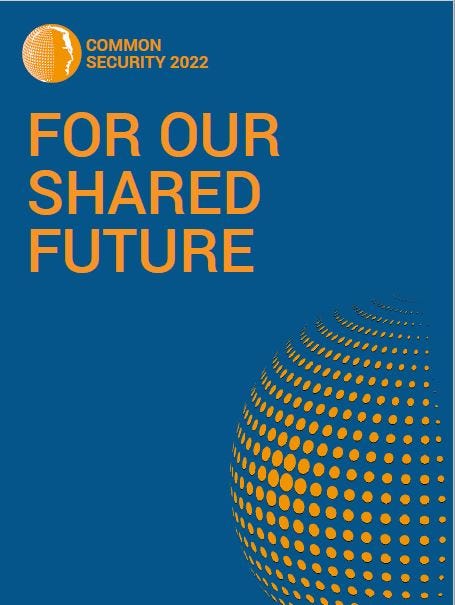Can we build “common security” as an alternative to war?
In 2022, humanity faces the existential threats of nuclear war, climate change and pandemics
Common Security 2022 is a vision and roadmap for how to create the other world that is possible. The report was issued on April 21, 2022, the 40th anniversary of the Palme Commission’s Common Security report which played a major role in ending the 20th century Cold War.
Here is an excerpt from the recently published report:
Introduction
The world stands at a crossroads. It is faced with a choice between an existence based on confrontation and aggression or one to be rooted in a transformative peace agenda and common security. In 2022, humanity faces the existential threats of nuclear war, climate change and pandemics.
This is compounded by a toxic mix of inequality, extremism, nationalism, gender violence, and shrinking democratic space. How humanity responds to these threats will decide our very survival. This year marks the 40th anniversary of Olof Palme’s Independent Commission on Disarmament and Security Issues.
The Commission presented its report in 1982, at the height of the Cold War, and the Commission developed the concept of Common Security – the idea that nations and populations can only feel safe when their counterparts feel safe. Palme’s Commission established a number of ‘principles’ – including that all nations have a right to security, that military force is not a legitimate means for resolving disputes between nations, and that reductions and limits on arms are necessary for mutual security.
In January 2022 the leaders of the five permanent members of the UN Security Council jointly stated that a nuclear war cannot be won and must never be fought. This echoed the declaration by US President Ronald Reagan and the Soviet General Secretary Mikhail Gorbachev at their Geneva Summit Meeting in 1985.
Our new Common Security 2022 report comes at a time when the international order faces severe challenges. A devastating war is raging in Europe and unceasing conflicts continue to plague people in far too many places.
We are witnessing a global crisis marked by the inability to stop climate change, a patchy and unequal global approach to the COVID-19 pandemic, and a long list of conflicts where the international community has failed in its response.
Even before the start of the COVID-19 pandemic more than six out of seven people worldwide felt insecure. Our common systems and structures – needed to provide security, combat poverty and inequality and prevent human suffering – are inadequate, and frequently ignored or violated. The future of humanity depends on us fixing the struggling global order. If we fail to repair our common systems, we will also fail in our fight against the climate crisis and future pandemics.
The global security system is teetering on the edge. As the UN Secretary-General’s report Our Common Agenda says: “Humanity faces a stark and urgent choice: breakdown or breakthrough”. This breakdown should serve as a wake-up call for the world.
Since the Palme Commission there have been multiple wars and acts of military aggression that show a blatant disregard for international law, such as in Iraq, Yemen and most recently in Ukraine. The Russian invasion of Ukraine in February 2022, while this report was being finalised, represents a catastrophic breakdown in common security.
It has resulted in a horrific loss of life, millions of refugees and displaced people, and global economic shockwaves. It is a terrible reminder of the fragility of peace. A ceasefire and peace settlement between Ukraine and Russia should be reached without delay in the interests of the Ukrainian and Russian peoples.
This breakdown in security is a reminder of the importance of international cooperation and respect for international law. The current system needs to be overhauled to prevent war and meet the common security interests of all states. There is an ongoing militarisation in the world, with rapid increases in military spending accompanied by nuclear threats.
But nuclear and military deterrence strategies have categorically failed to achieve peace and stability. It is time for a renewal of the global security system, based on common security principles. Now more than ever, we need a strong and efficient multilateral system for peace and security.
To turn the tide, we must:
> Reaffirm the UN Charter based on the rights and obligations of “we the peoples”. International cooperation and respect for international law must be fundamental to all states.
> Revitalise and implement the call by the UN Secretary General for a worldwide ceasefire, as the starting point for peace processes in different regions of the world.
> Reinforce respect for International Humanitarian Law as a matter of urgency, given the increasing harm to civilians in recent conflicts.
> Realise that global peace and security are created jointly – that when your counterpart is not secure, you will not be secure either. There must be respect for the UN Charter’s prohibition against the use of force and the inviolability of borders.
> Recognise that the threat of nuclear war and climate change are both existential threats to humanity.
> Strengthen trust between states and peoples, so that countries with different systems, cultures, religions and ideologies can work together on global challenges.
> Build a world order based on human needs. There is no development without peace, nor peace without development. And neither is possible without respect for human rights.
> Ensure inclusive governance at all levels in society, to safeguard democratic principles and the inclusion of women, young people and minorities. Forty years on from the original Palme Commission, the challenges of our interdependent global society demand, more than ever, collaboration and partnership rather than isolation and distrust. Common Security is about human beings, not just nations.
Now, in 2022, it is time to consider whether Common Security can help bring us back from the brink.


